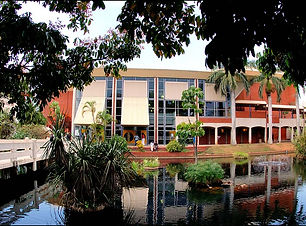Welcome home: Nigerian migrants in South Africa on visiting friends and relatives during the pandemic
UWEM UMOH SAMUEL | 19 DECEMBER 2020 | ISSUE #13

Source: Wikimedia Commons.
It is a common practice for migrants to visit friends and relatives, whom they may not have seen for years, during Christmas. Such travel is common amongst Nigerian migrants in South Africa, who often return home for Christmas to strengthen the bonds with their family and relatives. However, the COVID-19 pandemic has made travel increasingly difficult, and many migrants and their relatives are choosing not to travel. I interviewed several Nigerian migrants in Durban, South Africa, to understand why they had chosen not to travel and what the social implications of this might be.
Most of those interviewed decided to postpone their travel for financial reasons. Many Nigerian migrants in South Africa have lost their jobs, causing them to struggle financially. In addition, the cost of plane tickets may have increased. The cost and difficulty of obtaining COVID-19 tests also caused many to reconsider their plans. Gladys, a professional in Durban, expressed that she will likely not travel home because her sister told her that the COVID-19 testing process is very tedious and challenging. Gladys compared it to an extortion scheme, saying ‘Nigerians like to make profit during crises like COVID-19’. The COVID-19 test in Nigeria costs about 130 USD unlike in South Africa where COVID-19 test is provided at a cheaper rate of 46 USD or offered for free in some places. Many have decided that they prefer to send home to their families the money they would have spent on travel. Even those migrants who have financial security may not visit home for fear of putting their family at risk of getting the virus. The financial difficulty created by the pandemic, the challenging nature of the test and the worries about infecting their families mean that few Nigerians will be returning home for Christmas this year.
The disruption to travel has caused anxiety, and made it more challenging for families to connect during the holidays. As a postgraduate student from Nigeria expressed: ‘I just delivered a baby, ideally my mother should come by December to help me babysit my baby, but COVID-19 is affecting her coming. My mother is reluctant to come because of COVID-19 test and that COVID-19 affected her finances to book a flight’. This has not only made life more challenging for the student, but has deprived the family of bonding time and family rituals.
In addition, the virus has disrupted community rituals and practices, because it has prevented many Nigerians living abroad from returning home to take part in social functions such as weddings, house warmings, burials, and cultural functions. Social distancing measures and restrictions on local travel within Nigeria may also impact community celebrations. Normally, weddings are fixed during this period so that migrants returning home from abroad will be able to tie the knot with their whole family present or to attend such weddings. Also, chieftaincy titles are bestowed on the ‘sons and daughters’ of the community to honour those who contributed to the development of the community and philanthropy. In addition, children born abroad are taken home as a means of familiarising them with their culture and traditions, as well as meeting relatives. Due to this, they attend different cultural functions during the festive period. It is likely that Christmas in Nigeria will be subdued, with less spending and entertaining.
The COVID-19 pandemic is disrupting the social lives of people all around the world and Christmas will be no different. This year, many Nigerians might not be able to renew their ties with their family physically and many of the old community rituals will simply not be possible. Families will have to find innovative ways such as Zoom and Whatsapp to connect and celebrate Christmas.

Uwem Umoh Samuel
Uwem Umoh Samuel lectures in History and Cultural & Oral Heritage, at the University of KwaZulu-Natal, South Africa. He is also a field researcher for Tourism KwaZulu-Natal. His fields of interest include tourism, migration, indigenous communities, and governance. Find Samuel on Facebook @Samuel Uwem Umoh.




